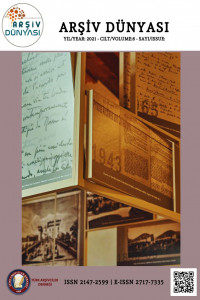Öz
Archives of the state fulfil a unique role in society. In order to govern the state collects information about us. It produces records of its actions, the decisions that led to those actions, and the analysis, options and evidence underpinning those decisions. The disruptive digital archive looks for new techniques to meet these challenges. That was the motivation of our research project, Archangel, which looked at using distributed ledger technology (also known as blockchain) to authenticate records held in the archive, over long timespans. We researched the prospects of creating content fingerprints, that we might write to the ledger, for content like video records, that we are likely to re-encode when rendering or producing the record. Looking ahead, there is no shortage of work for the disruptive digital archive to do.
Anahtar Kelimeler
Disruptive archives, national archives, information management
Öz
Archives of the state fulfil a unique role in society. In order to govern the state collects information about us. It produces records of its actions, the decisions that led to those actions, and the analysis, options and evidence underpinning those decisions. The disruptive digital archive looks for new techniques to meet these challenges. That was the motivation of our research project, Archangel, which looked at using distributed ledger technology (also known as blockchain) to authenticate records held in the archive, over long timespans. We researched the prospects of creating content fingerprints, that we might write to the ledger, for content like video records, that we are likely to re-encode when rendering or producing the record. Looking ahead, there is no shortage of work for the disruptive digital archive to do.
Anahtar Kelimeler
Ayrıntılar
| Birincil Dil | İngilizce |
|---|---|
| Konular | Kütüphane ve Bilgi Çalışmaları |
| Bölüm | Editöre Mektup |
| Yazarlar | |
| Erken Görünüm Tarihi | 27 Aralık 2021 |
| Yayımlanma Tarihi | 31 Aralık 2021 |
| Kabul Tarihi | 13 Aralık 2021 |
| Yayımlandığı Sayı | Yıl 2021 Cilt: 8 Sayı: 2 |


